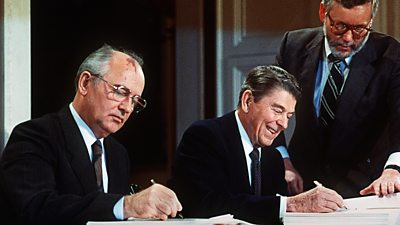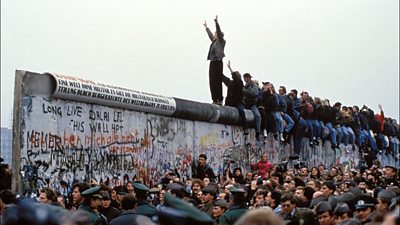The end of the Cold War was surprisingly quick. Within the space of two years, from the fall of the Berlin Wall in November 1989 to the dissolution of the Soviet Union in December 1991, the whole Soviet system unravelled. For the ±«Óătv, reporting this seismic shift in global history was a huge journalistic task. It also posed challenging questions about the future of the ±«Óătv’s language services to Central and Eastern Europe, now the Iron Curtain was gone.
The rise of Mikhail Gorbachev to the position of General Secretary of the Communist Party of the Soviet Union in March 1985, following in the footsteps if Joseph Stalin and Nikita Khrushchev, fundamentally and unexpectedly altered the course of the Cold War. The introduction of his policies of Glasnost (openness) and Perestroika (restructuring) established a new approach to Soviet domestic challenges and international relations on both sides of the Iron Curtain.

The agreement between the Soviet Union and America in 1987 to reduce nuclear arsenals by banning land-based ballistic and cruise missiles, demonstrated on the world’s stage that something radical was happening to governing attitudes in Moscow. And it was not the only change.
For Elisabeth Robson-Elliot, working in the (and later its Head) the whole nature of public discourse in the Soviet Union was changing. There was, she explains,
a feeling of exhilaration that the media were becoming more recognisable as respectable voices of the country …… And, of course, the changes in publishing under Gorbachev were extraordinary, when he talked about filling the white spaces in history. I mean, it was just an explosion of information that had been underground before. All about Stalin, the gulags, all manner of things that had simply been wiped off the record were now being put on the record.
Moreover, Soviet jamming of the ±«Óătv Russian Service was stopped in September 1987. But while these reforms indicated a liberalisation of state control, they masked a deeper economic crisis that was driving this change and undermining the whole Soviet system.
This made Moscow’s support of its satellite states difficult to maintain. And when protest movements in, for example, Poland, Czechoslovakia and East Germany threatened, Moscow was unable to help.
This was dramatically the case in East Germany when just a few months after celebrating the 40th anniversary of the German Democratic Republic (GDR), the Berlin Wall, the emblem of a divided Europe, fell.
For the ±«Óătv’s Moscow Correspondent, Bridget Kendall, withholding support from the GDR at this moment of crisis was part of a calculated risk by Gorbachev, as she recounts in this new oral history interview.
The fall of the Berlin Wall on 9th November 1989 took the world, including the East German authorities, by surprise. In response to a question at a press conference about imminent plans to allow limited travel to the West through border checkpoints, an under-briefed GDR spokesman, Gunter Schabowski, said he thought it should take effect immediately. This was not, in fact, the intention of the East German government, but it was too late.
This not only took journalists in the press conference by surprise, but also the border guards who had no knowledge of the change just announced. As news of this development got out, so thousands in East and West Berlin started to move towards the wall and at about 22.00 in the evening, people power, took control of Berlin.
Starting with the Polish elections in June 1989 in which Solidarity gained an overwhelming majority and followed by events in Berlin, the domino effect of collapsing communist systems in Central and Eastern, including the Baltics, was breath-taking.
But what of the Soviet Union itself, would it survive the revolution? This was the question that concerned Soviet hardliners and in August 1991 they attempted to take back control from Gorbachev and reassert Soviet orthodoxy.
For Bridget Kendall, the coup attempt started on a sleepy summer’s morning, with little warning.
Elisabeth Robson-Elliot of the ±«Óătv Russian Service also happened to be in Moscow at the time. As she recalls in this new oral history interview for the project, it quickly became apparent that something was wrong when early in the morning state television started playing Swan Lake, a historical echo from harder times and a sure sign that a political struggle for control was under way.
The failure of the coup, both in practical terms and in restoring old Soviet doctrines, was followed in December with the dissolution of the Soviet Union. In the course of two years Cold War certainties had been turned on their head.
For the ±«Óătv, who had devoted so much journalistic effort to covering every twist and turn over the previous four decades, especially in its overseas programmes, it was both a moment of joy and a cause for concern.
The Cold War had been a convening strategic idea around which the ±«Óătv’s language services to Central and Eastern Europe had coalesced since the end of the Second World War. But what would the future hold for them now?
This concern was well-understood by the Managing Director of the ±«Óătv World Service at the time, John Tusa, who “wanted a justification for international broadcasting, which would apply to the whole world, not just to closed societies... the theory was simply that you have a right and a duty to broadcast to anybody who wants information and that is a universal need”.
This was a laudable aim, but over the coming decade or so, government Grant-in-Aid funding for ±«Óătv language services to Europe was cut, bringing to an end a continuity of service that stretched back to the beginning of the Second World War.
The Cold War had offered a strategic rationale for these services, and it is perhaps a measure of their success that so soon after the collapse of the Soviet system, as the geopolitical focus moved elsewhere, it was felt that these services were no longer needed.
Written by Dr. Alban Webb, University of Sussex.

